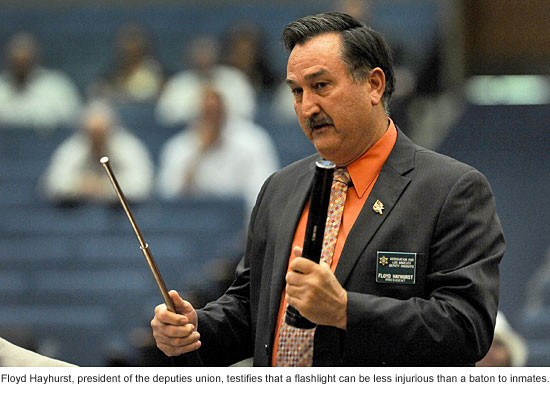Cracking down on jail beatings
October 26, 2011
 A united Board of Supervisors sent a strong message to the Sheriff’s Department this week that it will not tolerate brutality in the county’s jails, insisting that such conduct by deputies not only undermines the constitutional rights of inmates but also shatters public confidence in the wider law enforcement community.
A united Board of Supervisors sent a strong message to the Sheriff’s Department this week that it will not tolerate brutality in the county’s jails, insisting that such conduct by deputies not only undermines the constitutional rights of inmates but also shatters public confidence in the wider law enforcement community.
During its Tuesday meeting, the board approved a series of get-tough recommendations that call for, among other things, the installation of surveillance cameras throughout the sprawling jail system, a ban on using heavy flashlights as weapons, a mandate for medical personnel to report “suspicious” inmate injuries and a requirement for more intensive supervision.
But perhaps most ambitiously, the board created a seven-member commission to examine excessive force in the nation’s largest jail operation and provide a road map for reform.
“There are jails around the country that have had problems like ours in the past and they’ve turned themselves around,” said Supervisor Zev Yaroslavsky, who, with board colleague Mark Ridley-Thomas, called for the commission’s creation. “We’ve got to do that here.”
Yaroslavsky said the job involves more than promulgating new policies or rules. The commission’s most crucial and daunting role, he said, will be to determine the “fundamental issue” of how a small minority of abusive jail deputies have succeeded in “contaminating the entire culture of the institution.”
Yaroslavsky said Sheriff Lee Baca, who did not attend Tuesday’s session, supports the new Citizens’ Commission on Jail Violence, whose work is certain to be closely scrutinized by inmate advocates and civil liberties groups that have long complained about—and litigated over—conditions in the county’s overcrowded lockup.
“I think he needs help,” Yaroslavsky said of the sheriff. “And he recognizes he needs help. And I think we [the supervisors] need help. There is no monopoly of wisdom or information on the board, at the Sheriff’s Department or any other place.”
In pushing for “a fresh set of eyes” to examine inmate mistreatment, Ridley-Thomas said the Sheriff’s Department cannot be asked alone to tackle unwarranted deputy violence, which has persisted despite earlier and ongoing probes.
“There is a level of insularity that will only lead to our being back here over and over again,” he predicted. “To leave it exclusively under the domain of the Sheriff’s Department is problematic.”
Each of the five supervisors will appoint one member to the new commission, which will then name two more. The Board of Supervisors has asked staff for a budget plan for the commission, with funding coming from a Sheriff’s Department account used to pay lawsuits and settlements. It’s hoped that at least some of the commission’s staff will perform the work on a “pro bono” basis.
Before the board unanimously voted to create the commission and adopt nearly a dozen recommendations in a motion by Supervisor Gloria Molina, the deputies’ union chief urged supervisors to remain open-minded.
“I’m not here to claim that we have never had, nor will ever have, any bad personnel,” said Deputy Floyd Hayhurst, a 29-year-veteran of the department and president of the Association for Los Angeles Deputy Sheriffs, or ALADS. “We do, just like all of the professions. However, I’m here to ask you not to paint all of us with a broad brush and think we are not performing our jobs to the best of our ability with honor, dignity and respect.”
Despite years of controversy, the issue of excessive force in the jails has gained momentum in recent weeks with reports by the ACLU and in the Los Angeles Times of cases in which deputies allegedly brutalized inmates in front of civilian monitors and others who were shocked and scared by the behavior. There were also revelations of an FBI investigation into alleged jailhouse beatings.
Meanwhile, the Office of Independent Review, which monitors the Sheriff’s Department and reports to the Board of Supervisors, released a study earlier this month that turned up the public heat.
Describing the jail as a “cauldron of inmates, many with violent criminal histories,” the report said “it cannot be denied that deputies sometimes use unnecessary force against inmates in the jails, either to exact punishment or to retaliate for something the inmate is perceived to have done.” The OIR study further stated say that some deputies “get away” with these beatings because they “can craft a story of justification for the force which may be impossible to disprove.”
Among the questions the board has asked the Sheriff’s Department to explore in the weeks ahead is one that has been debated for at least two decades. That is: should the department continue its policy of requiring all new hires to start their careers in the custody division, where they can serve for years before assuming patrol duties?
Critics contend that impressionable rookies become quickly hardened by spending years in a grim environment among violent and hostile criminals. Not only do some deputies become brutal jailers, according to the critics, they end up carrying these aggressive behaviors and poisoned perceptions with them when they eventually hit the streets.
On the other side, top sheriff’s officials have long argued that custody experience prepares deputies—many of them young and naïve—in learning how to deal with gang members and other criminals as well as how to assert control without the use of a gun.
Currently, according to the department, the 3,500 deputies assigned to the jail spend an average of 3 to 5 years there. The board wants to know whether that time can be reduced and whether it’s advisable to create two separate career paths for deputies—one for custody duties, the other for patrol—an idea to which Baca has said he might be open.
Ultimately, it’s the sheriff who’ll decide what changes will be made in a department that L.A. County voters have elected him to lead. But as Supervisor Molina noted: “We do have a little bit of leverage because he has to get his budget approved by us.”
Posted 10/20/11













 405 bridge work causes a stink
405 bridge work causes a stink
